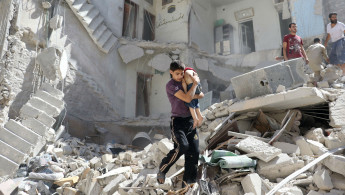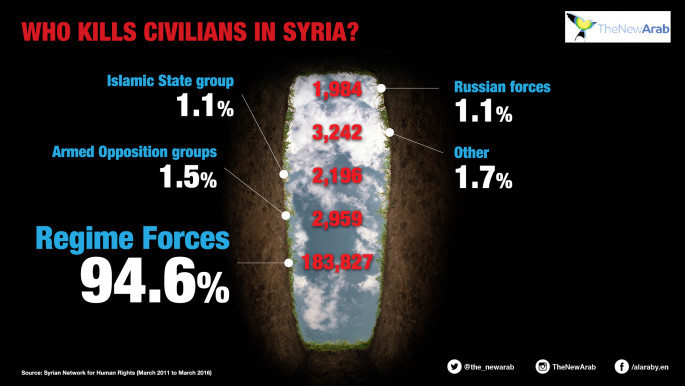Syrian rebels offered 'amnesty' as regime tightens Aleppo siege
Bashar al-Assad has reiterated claims that opposition fighters and civilians will be granted amnesty if they surrender, but this is already being met with skepticism by Syrians.
3 min read
Syrian regime forces have pulverized opposition parts of Aleppo with bombs [Anadolu]
The Syrian regime has offered an amnesty for rebels who lay down their arms and surrender, Damascus claimed on Thursday.
Bashar al-Assad said that Syrian opposition fighters who hand themselves over to the regime will be granted immunity from prosecution during an interview with Greek television.
He said that the amnesty has been in place since the beginning of the war.
"[The amnesty] it is virtually in effect because since the start of terrorist acts in Syria, we have offered this as an option for terrorists," he said, referring to rebels as "terrorists".
"If they want to return to normal life and lay down arms they will get amnesty... [it] is in effect now and is, as I see it, a good option to help those people who took up arms for different reasons to return to normal life."
Assad alleged that those who still want change can do so through the Syrian regime's current political framework.
"[They can return to] the political life in case they have their own agenda.. to go to political institutions… to head to the polls… to go for any kind of political measures available in any country," he said.
Syrian regime media said that rebel fighters who surrendered would escape "full punishment".
Damascus has made similar amnesty announcements in the past, but the offers have almost completely refused given the brutal nature of the regime.
Men who have surrendered to the regime or accepted safe passage out of rebel areas have often disapeared, believed to have been killed or sent to torture chambers.
The Syrian regime has tried to portray itself as open to criticism and having a political system that allows for dissent.
However, elections are tightly controlled and MPs are all considered to be regime loyalists.
Activists and human rights groups say Damascus is intolerant to all forms of opposition, with even minor criticism putting dissenters at risk of imprisonment and death.
It comes as the Syrian regime completes its encirclement of opposition areas in Aleppo. Damascus has said it will tighten its siege of these areas of the city, where reports of starvation and a large-scale humanitarian crisis are emerging.
Syrian state media alleged that text messages were sent out to residents in opposition areas of Aleppo as the regime prepares to capture the final parts of the city not under its control.
Food has been dropped on starving residents, but residents say thet are too scared to eat the supplies believing they could be poisoned.
Meanwhile, regime and Russian war planes have intensified their bombardment of non-government controlled parts of Aleppo, dropping scores of barrel bombs and rockets on residential areas over the past two days.
On Thursday, Russia said it had launched a "large-scale humanitarian operation" together with the Damascus to open humanitarian corridors for civilians and fleeing fighters.
Defence Minister Sergei Shoigu told Russian news agencies that three humanitarian corridors were being opened "to aid civilians held hostage by terrorists and for fighters wishing to lay down their arms".
One more corridor was allegedly opened up to the north of Aleppo, to allow rebels to flee with their arms, he said.
Taking Aleppo - once Syria's largest city and industrial hub - would be a major boost for the regime, who have been looking at securing major urban areas of the country.
Agencies contributed to this story.
Bashar al-Assad said that Syrian opposition fighters who hand themselves over to the regime will be granted immunity from prosecution during an interview with Greek television.
He said that the amnesty has been in place since the beginning of the war.
"[The amnesty] it is virtually in effect because since the start of terrorist acts in Syria, we have offered this as an option for terrorists," he said, referring to rebels as "terrorists".
"If they want to return to normal life and lay down arms they will get amnesty... [it] is in effect now and is, as I see it, a good option to help those people who took up arms for different reasons to return to normal life."
Assad alleged that those who still want change can do so through the Syrian regime's current political framework.
"[They can return to] the political life in case they have their own agenda.. to go to political institutions… to head to the polls… to go for any kind of political measures available in any country," he said.
Syrian regime media said that rebel fighters who surrendered would escape "full punishment".
Damascus has made similar amnesty announcements in the past, but the offers have almost completely refused given the brutal nature of the regime.
Men who have surrendered to the regime or accepted safe passage out of rebel areas have often disapeared, believed to have been killed or sent to torture chambers.
The Syrian regime has tried to portray itself as open to criticism and having a political system that allows for dissent.
However, elections are tightly controlled and MPs are all considered to be regime loyalists.
Activists and human rights groups say Damascus is intolerant to all forms of opposition, with even minor criticism putting dissenters at risk of imprisonment and death.
It comes as the Syrian regime completes its encirclement of opposition areas in Aleppo. Damascus has said it will tighten its siege of these areas of the city, where reports of starvation and a large-scale humanitarian crisis are emerging.
Syrian state media alleged that text messages were sent out to residents in opposition areas of Aleppo as the regime prepares to capture the final parts of the city not under its control.
Food has been dropped on starving residents, but residents say thet are too scared to eat the supplies believing they could be poisoned.
Meanwhile, regime and Russian war planes have intensified their bombardment of non-government controlled parts of Aleppo, dropping scores of barrel bombs and rockets on residential areas over the past two days.
On Thursday, Russia said it had launched a "large-scale humanitarian operation" together with the Damascus to open humanitarian corridors for civilians and fleeing fighters.
Defence Minister Sergei Shoigu told Russian news agencies that three humanitarian corridors were being opened "to aid civilians held hostage by terrorists and for fighters wishing to lay down their arms".
One more corridor was allegedly opened up to the north of Aleppo, to allow rebels to flee with their arms, he said.
Taking Aleppo - once Syria's largest city and industrial hub - would be a major boost for the regime, who have been looking at securing major urban areas of the country.
Agencies contributed to this story.






 Follow the Middle East's top stories in English at The New Arab on Google News
Follow the Middle East's top stories in English at The New Arab on Google News

![Israeli forces ordered bombed Gaza's Jabalia, ordering residents to leave [Getty]](/sites/default/files/styles/image_330x185/public/2176418030.jpeg?h=a5f2f23a&itok=_YGZaP1z)
